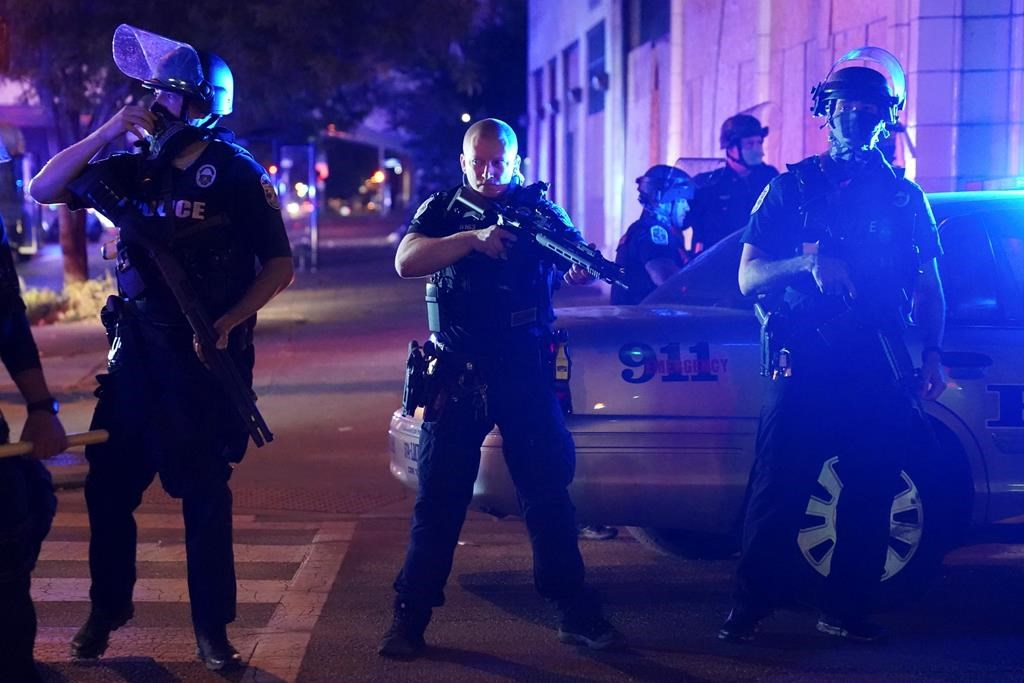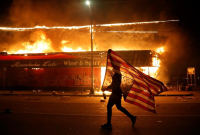Support strong Canadian climate journalism for 2025
America's streets are again pulsing with anger and frustration, this time over the deadly police shooting of 26-year-old Breonna Taylor ⏤ and a survey suggests the racial reckoning appears more popular in Canada than in the United States.
Protesters returned en masse to city centres across the U.S. in the latest display of racial outrage in 2020 after a grand jury in Kentucky opted Wednesday to not indict the officers who fired the fatal shots.
Taylor was killed in her own Louisville apartment in March when a botched drug raid aimed primarily at an ex-boyfriend erupted in a hail of bullets, precipitated when Taylor's boyfriend Kenneth Walker opened fire on what he said he thought was an intruder.
The indictments delivered Wednesday involved only a single officer: Brett Hankison, who faces three counts of wanton endangerment for blindly firing his weapon into the apartments of Taylor's neighbours.
Neither Hankison nor fellow officers Myles Cosgrove and Jonathan Mattingly, all three of whom were responsible for discharging more than 20 shots, are facing any charges related directly to the death of Taylor, who was hit multiple times.
The 2020 tumult over police treatment of Black Americans has been raging since May, when the death in Minneapolis of George Floyd, his neck under the knee of an arresting officer, touched off a worldwide uproar.
Violence and looting has accompanied a number of the protests. Boarded-up storefronts and Black Lives Matter graffiti are fixtures now in many downtown cores, and Louisville has become the latest epicentre.
Police there declared an unlawful assembly and arrested more than 100 people after fires were set in garbage cans, vehicles were damaged and stores were vandalized. A 26-year-old man was arrested and charged with firing at police and wounding two officers.
"Violence will only be a source of pain, not a cure for pain," said Louisville Mayor Greg Fischer, a Democrat.
"Many see Breonna Taylor’s case as both the tragic death of a young woman and the continuation of a long pattern of devaluation and violence that Black women and men face in our country, as they have historically."
Senate Majority Leader Mitch McConnell called the shootings of police officers acts of "despicable cowardice that must be met with the full force of the law."
Republicans in general, and President Donald Trump in particular, have seized on the lawlessness as a way of turning the unrest to their political favour.
"I think it's a sad thing and I give my regards to the family of Breonna," Trump said Thursday.
"It's fine to (protest) in a peaceful manner, but when it gets less than peaceful, as you see all over, then it's unacceptable and that's where law and order is necessary, that's where it law enforcement is very important."
The months-long calls for social justice appear to have more support among Canadians than it does in the U.S., a new online poll from Leger and the Association for Canadian Studies suggests.
The poll, conducted last weekend, found 67 per cent of 1,500 Canadian respondents reported a positive view of the Black Lives Matter movement, compared with just 55 per cent of 1,000 U.S. respondents who felt the same way.
Only 33 per cent of Canadians polled reported feeling negatively about the movement, compared to 45 per cent of Americans.
Where Americans and Canadians do appear to agree is on the question of whether the protests are likely to lead to lasting change.
In Canada, 45 per cent of respondents said no, compared to 33 per cent who said yes and 21 per cent who said they didn't know. U.S. respondents felt similarly, 46 per cent to 33 per cent, with 20 per cent undecided.
Online polls do not carry a valid margin of error and are not considered representative of the population at large because they are not based on a random sample.
This report by The Canadian Press was first published Sept. 24, 2020.
— With files from The Associated Press





Comments